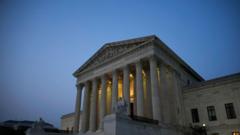The U.S. Supreme Court convened on Thursday to deliberate on President Donald Trump’s controversial executive order that seeks to eliminate birthright citizenship, a move that could significantly alter the immigration landscape in the United States. The case raises critical questions about the limits of presidential power and whether lower court decisions should govern national injunctions.
During the two-hour session, justices voiced divergent opinions on the authority of lower courts to block presidential directives, an area ripe for legal contention. The solicitor general representing the Trump administration contended that lower courts have overstepped their bounds, claiming such power should be restricted. Conversely, a representative for New Jersey and several other states argued that upholding Trump’s order would lead to a chaotic and inconsistent citizenship framework across the country.
Amidst fierce legal scrutiny, the justices closely examined the implications of this order on the principles defined by the 14th Amendment, which guarantees citizenship to anyone born or naturalized in the U.S. Trump’s administration asserts that the amendment does not extend automatic citizenship to children of undocumented immigrants or temporary visitors, a view that has faced significant legal challenges.
Arguments were presented regarding the practicality and constitutionality of potential alterations to citizenship rights. The states' attorney warned of a dangerous precedent that could create discrepancies; residents might have varying citizenship statuses based on their location, which could impact access to government services and even immigration enforcement.
Outside the Supreme Court, a crowd of demonstrators gathered, with prominent voices such as Congresswoman Nancy Pelosi rallying against Trump’s immigration policies, emphasizing the need to uphold citizens’ rights and due process as enshrined in the Constitution.
The Court's ruling on this matter could bestow sweeping authority upon the presidency by potentially affirming the limitations of judicial checks on executive power. Such a decision may also have far-reaching consequences for thousands of children currently living in the U.S. who could face challenges to their citizenship status, complicating their lives and futures.
Legal experts overwhelmingly suggest that Trump lacks the constitutional authority to rescind birthright citizenship, which has been consistently protected since the enactment of the 14th Amendment. Even if the Supreme Court were to side with the Trump administration, further legal challenges could arise, keeping the debate alive well beyond the current proceedings.
This case, a product of multiple lawsuits from immigration advocates and states, showcases the contentious battle over immigration policies and the role of the Supreme Court in interpreting these pivotal social issues. With multiple court injunctions against the Trump administration already in place, the outcome of this hearing remains uncertain as America stands at a crossroads regarding the fundamental principles of citizenship.




















